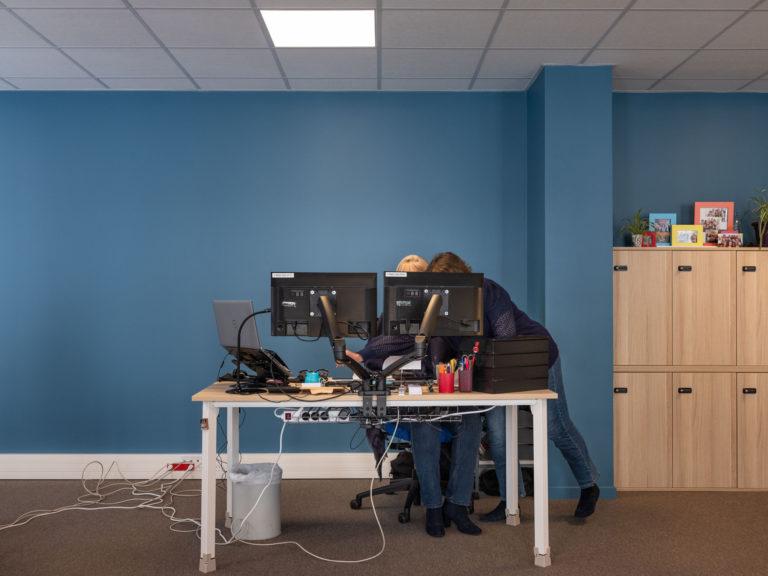What remains is future
2006 - Film & Video (Film & Video)
5,24min
Laurent Montaron
This film refers directly and fictionally to one of the first media dramas: the burning of the Zeppelin aircraft LZ 129 Hindenburg as it landed in New York in 1937. The power of these images, which were widely diffused in the press, had a profound haunting impact on people’s consciousness. This mode of transport – both futuristic and obsolete – crystallizes a collective imaginary which was fed by cinematic, literary and mythological fiction as Barthes would put it. A mass advances progressively towards the spectator, the camera glides right up to this monster, which is as graceful as a sea mammal, but flames perturb this vision. The mass disappears from view, making it impossible to define clearly, and finally exits the image field. Realized with an anaglyph process – which superimposes two slightly offset images to produce an effect of depth – the film prevents the experience of the third dimension and emphasizes the tricks of fabrication since it is viewed without special glasses. Due to its materiality and blurriness, the image, which is accompanied by a sinusoid wave, exerts a powerful haptic and hypnotic fascination.
Using a variety of media – photography, film, sound, installation, sculpture – Laurent Montaron’s work ‘renders an image’ in Mélancolia (2005) the magnetic band of an echo chamber endlessly loops and unwinds to become a hypnotic serpentine line. ‘To render an image’ can be understood in the sense of crystallizing a set of archetypes and fantasies in a sensory mental representation. In the film Readings (2005), a researcher at the astronomical observatory in Meudon observes his bloody hand caused by the tooth he has just lost in a suspended space-time. “I would say that I construct my images like scenes in which the beginning and the end are missing, in which the scenario is contained in a very short lapse of time. They are often like a film still with no attached synopsis” according to Laurent Montaron. These images are formed within a time warp, a ‘rupture’ (Georges Didi-Huberman), a concept which is also present iconographically in BALBVTIO (2009, two identical films, shot differently, projected simultaneously). Each one of the artist’s works necessitates a particular attention span, different for every spectator. Laurent Montaron was born in 1972 in Verneuil-sur-Avre, France. He lives and works in Paris.
Colors:
Related works sharing similar palette
» see more

© » EYE OF PHOTOGRAPHY
© 2023 All rights reserved - The Eye of Photography Olivier Culmann, URSSAF Normandie, site du Havre @ Olivier Culmann Le Havre, Seine-Maritime, Normandie, France 10/05/2023 © Olivier Culmann / Tendance Floue @ Thomas Jorion @ Sidonie Van Den @ Isabelle Scotta @ Carlo Lombardi S From October 21st to January 7th, 2024, for its 14th edition, 25 international photographers, both established and emerging, can be discovered in an open-air exhibition tour throughout the city, on the beach, and indoors at Point de Vue and Les Franciscaines...

© » KADIST
Participants include American Artist (artist); Anti-Eviction Mapping Project (data-visualization, data analysis, and storytelling collective); Jérôme Bel (choreographer); James Bridle (writer, artist, and technologist); Kate Crawford (Distinguished Research Professor at NYU); Martha Kenney (Assistant Professor of Women and Gender Studies at San Francisco State University); Laura Kurgan (Professor of Architecture at GSAPP, and Director, Center for Spatial Research, Columbia University); Trevor Paglen (artist and researcher); Gala Porras-Kim (artist); Kameelah Janan Rasheed (artist and learner); Steve Rowell (artist); Davide-Christelle Sanvee (performance artist); and Andros Zins-Browne (choreographer)...

© » PRISHTINA INSIGHT
2024 Budget Prioritizes Defense at the Expense of Economic Development - Prishtina Insight Home Kallxo Jeta në Kosovë Drejtësia në Kosovë Gazeta JNK Log In Subscribe News Features Opinion Guide Big Deal Archive Follow @prishtinsight Design: Prishtina Insight 2024 Budget Prioritizes Defense at the Expense of Economic Development The Assembly of Kosovo has provisionally approved the Draft Law for the 2024 budget, just days after the Government of Kosovo endorsed it with a value exceeding 3 billion euros...

© » KADIST
Caroline Monnet, Mobilize A screening program followed by the artist in with conversation with Adam Piron, Assistant Curator for Film at LACMA Montreal-based artist Caroline Monnet explores Indigenous identity, bicultural living, and complex cultural histories through photography, sculpture, film, video, and installation...
Related artist(s) to: Laurent Montaron » Guillaume Leblon, » Katinka Bock, » Aurélien Froment, » Berlin Dada, » Daniel Tremblay, » Gabriel Orozco, » Gerhard Richter, » Giuseppe Penone, » Glenda León, » Julien Discrit
» see more

© » KADIST
Guillaume Leblon
2008Puits (“Wells”) is a circle made ??of raw earth elements, at the scale of Leblon’s hands...

© » KADIST
Gabriel Orozco
1992Gabriel Orozco often documents found situations in the natural or urban landscape...

© » KADIST
Aurélien Froment
2008The Théâtre de poche video is inspired by Arthur Lloyd / “Human Card Index”, a magician who was famous for being able to take out of his pockets any image requested by his spectators...

© » KADIST
Gabriel Orozco
1994Charco portátil congelado (Frozen Portable Puddle, 1994) is a photographic record of an installation of the same name that Gabriel Orozco made at Witte de With Center for Contemporary Art in Rotterdam for the group exhibition WATT (1994)...
Related works found in the same semantic group
» see more

© » KADIST
Fabien Giraud & Raphael Siboni
2014– Thisstoryoffriedrichkurzweiliwanttotellit- myselfhowhelivedinthisroomandh – Inspired by the writings of the feral child Kaspar Hauser and told by the young Friedrich, both father and son of Ray Kurzweil, this story unfolds on the microscope images of a blade cutting through metal...

© » KADIST
Xiaoyun Chen
2006The image of rusted nails, nuts and bolts as shrapnel sandwiched between a fried Chicken burger highlights the contrast between decadence and destruction...

© » KADIST
Thomas Kilpper
2009These two images come from the series called “State of Control” which Kilpper made in the building formerly occupied by the Stasi in Berlin...

